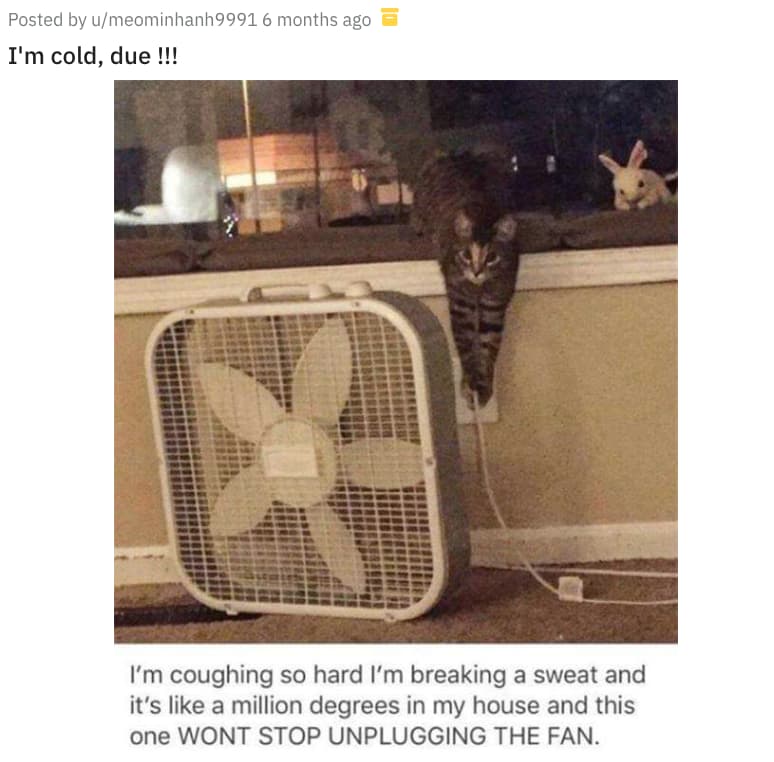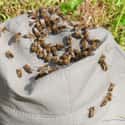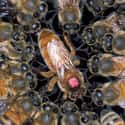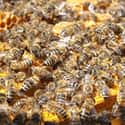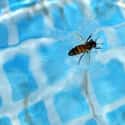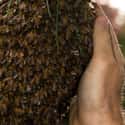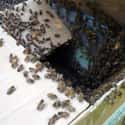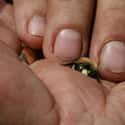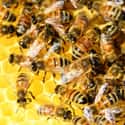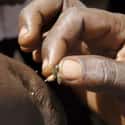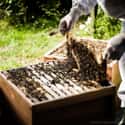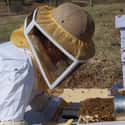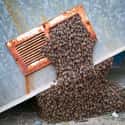-
(#1) It'll Probably Be Your Fault
Believe it or not, the average bee is not an aggressive nightmare, even if it's hanging out with a whole lot of other bees. Wasps and hornets may be aggressive little bugs, especially at a picnic, but bees honestly are not very interested in your sandwich or your glass of wine. Because of this, if you're attacked by a swarm of bees, chances are you probably did something to incite it.
Swarms may be on the move away from a hive, as when a group seeks out a new residence due to overcrowding or a new queen, and you may just be in the wrong place at the wrong time, but this is rare. More likely, you stepped in their nest or swatted it. Maybe you tried to spray the swarm, or tried to vacate them from wherever they were nesting. The most common way for you to get attacked by bees is for you to do something to upset them, either on accident or on purpose. Just be smart out there and don't go around antagonizing bees.
-
(#2) Unless They Are Africanized
Unfortunately, there is one very specific case where bees can get unusually aggressive. In the early 1990s, Africanized honey bees first hit the scene in North America, and things began to get a little more violent. These bees are identical in appearance to our usual bees, which were brought over from Europe, but the difference is that they're far more touchy when it comes to intruders. They're more likely to attack you, will chase you for longer, and have a much lower tolerance for nest invasion or damage. In other words, just being in their near vicinity can set these guys off.
What's worse is that in Texas, most domestic bees have some crossbreeding with Africanized bees, which may account for the fact that several bee-related deaths over the last few years have taken place in Texas.
-
(#3) You Don't Actually Have to Be Allergic
The vast majority of deaths due to bees have to do with some sort of allergic reaction. People have a reaction to the venom in bee stings, they go into anaphylactic shock, and they can die within minutes of the initial sting. However, that's not the only way bees can kill you. Bee venom is, in fact, harmful, but the average bee doesn't produce enough venom in order to do any real damage. Plus, bees don't sting you over and over - a bee can only inject venom into your body once before dying. However, if attacked by a swarm, you may receive tons of stings, and that can be enough to become seriously dangerous.
If you're wondering how much you could take, keep in mind that the average human can tolerate ten stings per pound of body weight. So, it'll take a lot to kill you, but it is certainly possible.
-
(#4) They'll Chase You for a Long Time
So, let's say that you've disturbed a nest and a swarm of bees is coming after you. What's the best thing to do first? Why, run, of course! Standing still, ducking and covering, and trying to fight them off are the worst things you can do, so rely on that flight instinct and get going!
There's only one little problem with this plan: you're going to have to run for quite a while. You see, bees are pretty fast in general, and once they've made up their mind to mess you up, they're pretty determined. Some swarms of bees even chase down their victims for up to half a mile before giving up, assuming they don't catch and incapacitate you first. So let's hope you've been working on your cardio.
-
(#5) Jumping in the Water Won't Help
You might think that diving into a lake or a pool might keep the bees away from you, but this is actually a terrible plan. It's not like once you hit the water the bees give up, and you need air to live, so you're going to have to surface eventually. The bees are going to be waiting for that opportunity. They'll also know you're there, so they won't get tired and eventually go home. They'll call for reinforcements, and you'll be stuck in the water for a long time, being stung whenever you come up for air. Even the USDA warns strictly against seeking refuge in water.
-
(#6) You May Be Stung Over 1000 Times
If you come across a swarm away from a hive, it usually means one thing. When a hive becomes overcrowded, a new queen can sometimes appear and take over; then a large portion from the original hive has to leave. We're talking about a queen and up to 20,000 bees just flying along in a single swarm, looking for a new home. If you get in their way, they can decide it's time for you to go down.
People who have died from bee swarms have been found with 1,000 individual stings, and that number could be even higher. What's worse is that the more you fight back, the more stings you may get. Again, running or getting inside are really the only ways you have a chance.
-
(#7) More Bees Will Keep Coming
Bees have a pretty cool means of communication, but that kind of bee-talk spells bad news if you're caught in a bee swarm. When bees start fighting with something, they release an alarm pheromone meant to warn other bees of danger. What this also does is rallies other fighters to their cause. That means bees in their vicinity are going to join the chase or attack. More and more bees will keep coming as the fighters begin to die, and they won't care who or what you are, just that there's something near them that needs to be destroyed. This alarm pheromone can go out almost instantly, so it's a matter of minutes before reinforcements arrive.
-
(#8) Venom Is Going to Enter Your Blood Slowly
So how exactly do bees inject venom into you? You're swarmed, you're being stung, and you're starting to feel pained and woozy, but why? Well, for starters, when a bee stings you, the stinger detaches from the body, killing the bee. But the venom doesn't stop injecting when the bee dies. There's a sac attached to the stinger that begins pumping you with the stuff the moment the skin is broken, but it continues doing this slowly over a period of time. That's one major reason why bee swarm stings seem to get worse as time passes.
Unfortunately, trying to remove the stingers may make it worse. It's good to remove them, so the venom injections stop, but if you use tweezers, you can actually squeeze the sac, injecting even more of the stuff into your blood stream. Once there, the venom will spread to your heart, lungs, and other vital organ.
-
(#9) You're Going to Be in Searing Pain
We all know that bee stings hurt, but being stung by hundreds or thousands of bees is a whole different story. The venom bees inject into you can start attacking your blood vessels and muscles, and you may feel sick to your stomach, dizzy, achy in your joints, but most of all, you'll feel pain. You may develop hives or open wounds around the stings, and you'll feel burning and itching at the site of injection. You may feel like your muscles themselves are on fire, and the feeling will only get worse over the next few minutes during the attack. The more you're stung, the more it will hurt. The pain can even be incapacitating, and can lead to your escape efforts pretty much evaporating.
-
(#10) You're Going to Swell Up
One thing you may have noticed with one or two bee stings is that the area tends to swell up where you've been stuck. It will get red, it will puff up, and it will turn pink or red as it does so. This is due to your body trying to fight off the venom by sending more blood and more white blood cells to that location. Now, imagine that happening all over your body. When thousands of bees sting you, your face will swell, as will your tongue. Your eyes may swell shut, your throat may swell closed, and your hands may become so swollen that you cannot properly use them.
As this happens, you may feel numbness begin to take over. This is a bad sign, because it means the venom is genuinely beginning to kill you.
-
(#11) You'll Have Trouble Breathing
Trouble breathing is generally a sign of allergic reaction rather than a reaction to the bee venom itself, but it can still happen when you're stung enough times. As you are stung, the venom will begin to reach your heart and your lungs. When it does this, your heart will speed up, trying to process the stuff out of you. You may feel like you've been running for miles (if you haven't already really been doing that while trying to escape) and you may feel your heart pounding. Your blood pressure is going to drop, and you may even begin to lose consciousness. Your body will try to save you, of course, but too much venom from any creature is eventually enough to start shutting things down and killing parts of you.
-
(#12) You'll Start to Have Seizures
If you were having an allergic reaction to bee venom, this is the time when you'd go into anaphylactic shock. Unfortunately, in this case, we're going to look at what happens when you just have so much venom in you that your body cannot cope. As you feel sick to your stomach and begin to faint, your body is going to start to go haywire. When this happens, you may start to have full-on seizures. Your brain is trying to compensate for your blood being full of toxins, sending everything it can to help, but at this point it's not enough. The seizures are a sign that different parts of your body are failing. At this point, there's not much that can be done to save you, because...
-
(#13) Other People May Not Be Able to Help You
Remember that alarm pheromone we mentioned earlier? Well, here's where it gets to be an issue. As the bees are whipped up into a frenzy of "kill the intruder," they are not really selective about who they attack. This means that rescue workers, your friends, and anyone around you is fair game. The biggest problem here is that this means people just have to sit back and wait until the bees are done with you before they can try to rescue you. Bee attacks can go on for hours, and the more you're stung, the less time alive you have left. In other words, the bees are going to destroy you body, and they're going to keep everyone else away from you while they do it. There's no escape. There's no rescue. Just you and a whole mess of bees.
-
(#14) You Could Be Dead Within Minutes
In the end, massive amounts of bee venom can cause a huge range of life-threatening problems. Hemolysis, disseminated intravascular coagulation, rhabdomyolysis, and acute renal failure have all been witnessed in those stung by a mass of bees. In short, your body just stops functioning properly. Your heart can shut down, your lungs can shut down, and your kidneys can shut down. Even if you're able to run from the swarm and you survive the mass of stings, there's still a chance it can kill you later, after it gives you terrible diarrhea and confusion. The fact of the matter is that some of these conditions can take hold in hours, or even minutes, and then you'll be dead before help can reach you.
In review, if you see a bee swarm coming your way, run! Don't walk. Don't jump in the water! Instead run for cover, don't stop until you get indoors or you're sure that the bees are gone. If you see any signs of allergic reaction or have problems breathing, get to a hospital for treatment as soon as possible. Nicholas Cage certainly had it right when he said "not the bees!"
New Random Displays Display All By Ranking
About This Tool
I believe that many people have been stung by bees when they were young. Have you ever thought about being stung thousands of times by bees? On June 1, 2013, a man in Texas was attacked by a swarm of bees and died while trying to clean a beehive. This attack can definitely be regarded as the most terrifying death in the world.
There’s still much we don’t know about these fascinating small creatures, but one thing is sure, bees are mighty small who defend themselves with ferocity. It is necessary to learn how to treat the attack of bees. The random tool explained 14 details about how it will be if attacked by a swarm of bees.
Our data comes from Ranker, If you want to participate in the ranking of items displayed on this page, please click here.








